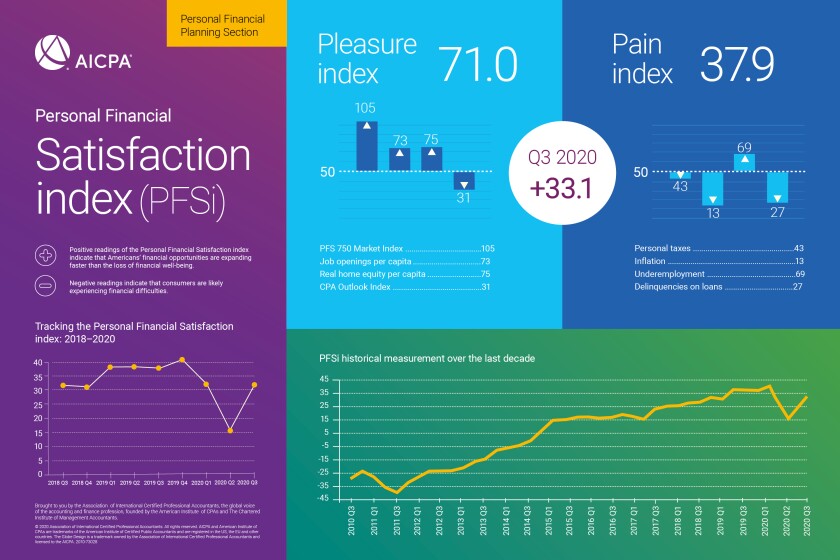Financial satisfaction of people in the U.S. rebounded strongly in the third quarter of the year, according to a new survey by the American Institute of CPAs, reversing the lows in the second quarter in the midst of the recession brought on by the novel coronavirus pandemic.
The AICPA’s Q3 2020 Personal Financial Satisfaction Index measured 33.1, representing a whopping 99 percent (16.5 point) increase from the previous quarter. That’s the biggest quarterly increase in the 27-year history of the PFSi, and a complete turnaround from the second quarter, when the index had its largest ever quarterly drop.
With more than 25 years of experience in the insurance and technology industries, George Robertson provides a seasoned perspective on emerging technological trends and their impact on insurance professionals and clients. As a former board member of the Independent Insurance Agents & Brokers of America (IIABA) Agency Council for Technology, he has played a key role in tracking strategic developments that shape consumer expectations and business opportunities.
George also served as co-chair of the Cyber Workgroup, where he helped develop The Cyber Guide for Insurance Agents, a resource designed to assist agents with cyber regulation compliance and safeguard both agencies and their customers. With expertise in cyber insurance, insurtech, artificial intelligence, and agency automation, he delivers valuable insights that drive innovation and progress within the insurance industry. He can be reached at grobertson@ncinsquote.com.
Date: Monday, September 29, 2025
Gail McGiffin is the Managing Director and Global Insurance Advisory Lead at EPAM, where she helps insurers deliver large-scale transformation programs focused on growth, efficiency and digital innovation. With over 35 years of experience in insurance leadership, she specializes in underwriting modernization, data-driven platforms and operational efficiencies.
Before joining EPAM, Ms. McGiffin was the Chief Information and Operations Officer and board member at Vantage Group Holdings Ltd., where she led technology and operations. She previously served as Global Insurance Underwriting Lead and Partner/Principal at EY, Chief Information Officer and a member of the board of directors at ProSight Specialty Insurance and Managing Partner at Accenture, where she established and led the Global Underwriting Practice. Ms. McGiffin began her career at Chubb, holding leadership roles in underwriting and product innovation.
The PFSi is built around various factors, including the labor market. The gains can be mainly attributed to improvements in job openings per capita and underemployment. Those had the biggest impact on increasing the overall PFSi. The biggest factor driving the quarter-over-quarter rally was a 35 percent (37 point) decrease in underemployment. A decrease in underemployment improves overall financial satisfaction in the index. While there was an improvement in underemployment in the third quarter from Q2’s record high, it’s still 117 percent above its level a year ago. For the second consecutive quarter, underemployment is still the biggest negative contributor to the average American’s personal financial satisfaction. The Q3 underemployment level reflects data measured through the middle of September.
“As Americans continue to navigate the economic impact of the COVID-19 pandemic, it is important to remember that the fundamentals of financial planning haven’t changed,” said AICPA PFS Credential Committee chair Dave Stolz in a statement Thursday. “Though the stock market’s record performance is encouraging, 2020 has served as a reminder of the volatile nature of markets. As the impact of COVID-19 continues to play out across the country, investors should weigh their risk tolerance and ensure they have ample cash on hand. Further, a tax-efficient financial plan that includes a diversified portfolio can give confidence that long-term financial goals will remain within reach through this period of extreme uncertainty.”
The coronavirus put millions out of work, prompting job openings per capita to show a record plummet earlier this year. In the third quarter, job openings started to recover, climbing 37 percent (20 points) compared to Q2. That factor is now only 10 percent below its measurement a year ago before the pandemic. The Q3 index comes from July data from the U.S. Bureau of Labor Statistics.





